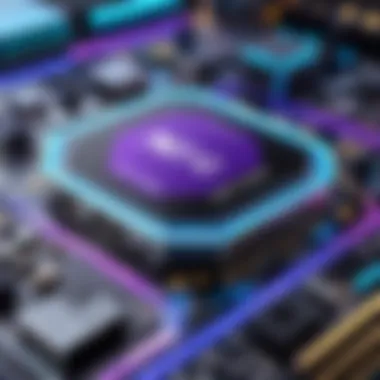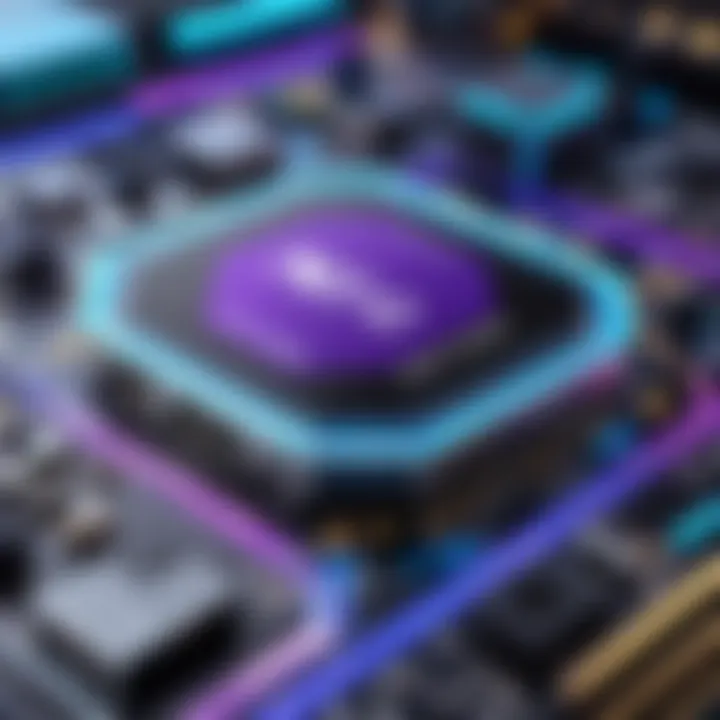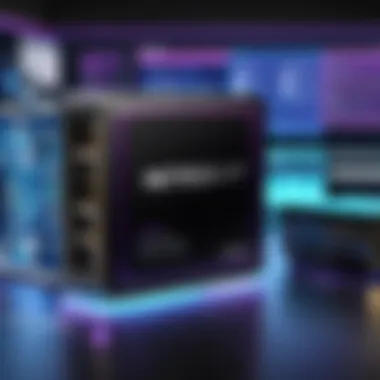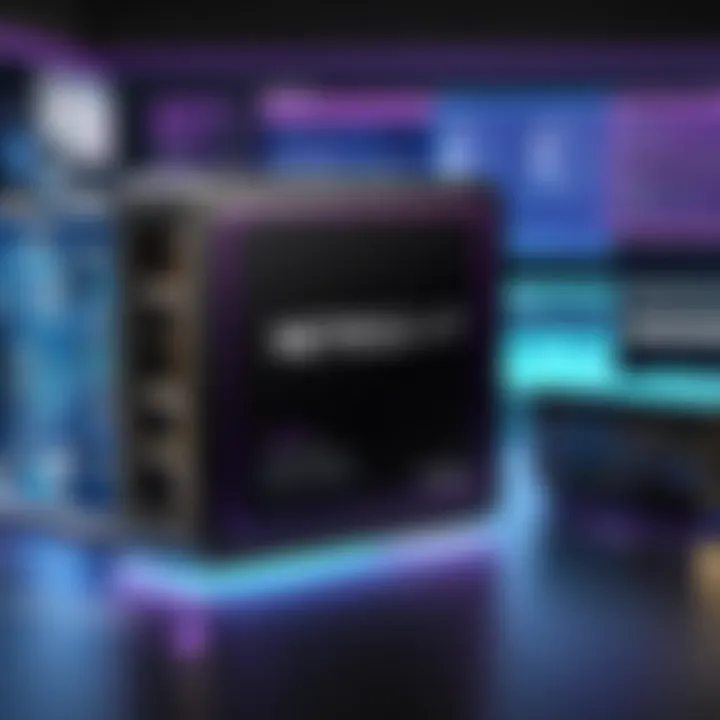Differentiating Netgear and Netgear 5G Solutions


Intro
In the ever-evolving digital landscape, the distinctions between various networking solutions can significantly influence both personal and business connectivity needs. This article seeks to delineate the differences between Netgear, a well-established entity in the networking technology realm, and its tailored 5G offerings. Understanding these differences is vital for professionals and tech enthusiasts who aim to make informed decisions based on specific performance metrics, usability, and targeted market applications.
Technological Research Overview
Diving into the technological frameworks behind Netgear and its 5G products illuminates the core capabilities of each solution. Netgear, known for reliable routers and networking equipment, operates under traditional broadband connections, while their 5G products offer a new frontier in connectivity, promising higher speeds and lower latency.
Recent Technological Innovations
The shift towards 5G has heralded a wave of innovations, positioning Netgear to gear up its product lineup. The introduction of advanced routers like the Netgear Nighthawk 5G Mobile Hotspot stands testament to this progression, allowing users to connect multiple devices seamlessly. These products utilize technology such as carrier aggregation and enhanced MIMO to elevate the user experience, catering to both residential and business sectors.
Impact on Business Operations
For businesses, the transition from traditional networking to 5G can lead to increased productivity and more reliable connectivity. Fast and secure internet helps companies streamline their operations, enhancing collaboration tools and remote work capabilities. Technologies enabled by Netgear's 5G offerings become game-changers, particularly for industries requiring real-time data transfer, such as healthcare and finance.
Future Technological Trends
Looking ahead, the landscape is ripe with upcoming trends like multi-gigabit broadband and improved cloud integrations. Analysts predict that the demand for real-time analytics and IoT devices will escalate, pushing companies like Netgear to innovate continuously. Staying abreast of these trends is imperative for stakeholders aiming to leverage the latest technological advancements.
Data Analytics in Business
In an age where data drives decisions, analytics have transformed businesses by providing valuable insights. Utilizing both traditional and 5G capabilities, organizations can analyze data more expediently.
Importance of Data Analytics
The significance of data analytics cannot be overstated. Businesses harnessing accurate data analytics can make strategic decisions, anticipate market trends, and enhance customer experiences. This practice becomes even more crucial in networking where real-time data is needed for optimal operation.
Tools for Data Analysis
Many robust tools can facilitate data-driven decision-making, including:
- Tableau: Great for visual data representation.
- Google Analytics: Essential for monitoring website performance.
- Microsoft Power BI: Offers comprehensive business intelligence capabilities.
Case Studies on Data-Driven Decisions
Numerous companies have illustrated the impact of data analytics. For instance, a retail chain used analytics to optimize its supply chain management, resulting in significant savings. Another case involved a healthcare provider that improved patient outcomes by tracking and analyzing treatment data effectively.
Cybersecurity Insights
As connectivity increases, so do the vulnerabilities. Understanding the nuances of cybersecurity is paramount.
Threat Landscape Analysis
The networking ecosystem faces threats such as malware and phishing attacks, which can undermine the very solutions Netgear offers. Analyzing these threats provides insights into preventative measures.
Best Practices for Cybersecurity
To fortify network security, businesses should adopt best practices, including:
- Utilizing strong passwords and regular updates.
- Employing firewall protections.
- Implementing user access controls.
Regulatory Compliance in Cybersecurity
Remaining compliant with regulations like GDPR and CCPA is essential for organizations. Adhering to these regulations not only safeguards customer data but also enhances a company's reputation.
Artificial Intelligence Applications
The integration of artificial intelligence into networking solutions has the potential to revolutionize operations.
AI in Business Automation
AI streamlines processes, enhances operational efficiency, and augments customer service by analyzing patterns and automating routine tasks. Techniques such as machine learning empower businesses to predict network demands proactively.
AI Algorithms and Applications
Businesses are increasingly utilizing algorithms to manage network traffic, detect anomalies, and optimize performance. By harnessing these algorithms, organizations can ensure smooth operations even in fluctuating conditions.
Ethical Considerations in AI
With great power comes great responsibility. Businesses must navigate ethical challenges surrounding data privacy and algorithmic bias to maintain public trust and adhere to regulations.
Industry-Specific Research
Different sectors face unique challenges and opportunities when leveraging networking technologies.
Tech Research in Finance Sector
In finance, secure, and high-speed networking is crucial. The rise of digital banking necessitates innovative solutions that Netgear’s 5G products can provide, ensuring safe transactions and real-time data analytics.


Healthcare Technological Advancements
In healthcare, 5G connectivity facilitates telemedicine and remote monitoring. The speed and reliability of these networks allow healthcare professionals to deliver timely care and monitor patients effectively.
Retail Industry Tech Solutions
Retailers can leverage advanced networking solutions to enhance customer experiences. From improving inventory management to providing personalized marketing, the right technological framework can transform customer interactions.
The distinction between traditional Netgear offerings and its 5G solutions shapes the future of connectivity, making it imperative for decision-makers to understand these differences.
Intro to Networking Technology
In today's interconnected world, network technologies serve as the backbone of efficient communication. Understanding these technologies is crucial for anyone navigating the complexities of modern connectivity. From staying in touch with colleagues across continents to streaming that must-see show in high definition, the need for reliable networking can't be overstated. This article takes a deep dive into the distinctions between Netgear and its advanced 5G offerings, outlining why these differences matter to both home users and professionals alike.
The Importance of Reliable Networking
Reliable networking forms the essence of our daily digital interactions. Think about it: how often have you been frustrated with a buffering video during a crucial meeting or when trying to connect a smart home device? The importance of stable, robust network infrastructure cannot be ignored. A network that falters can lead to lost business opportunities or a tarnished personal experience.
The benefits of reliable networking extend far beyond mere frustration reduction. It fosters productivity, better collaboration, and enhances overall satisfaction. For businesses, a solid networking foundation can directly translate into enhanced operational efficiency—a chain reaction that boosts staff morale and ultimately impacts the bottom line positively.
Overview of Networking Companies
When discussing networking solutions, several players like Netgear emerge as central figures. With a rich history spanning over two decades, Netgear has carved a niche in providing robust networking solutions for both home and business environments. They are known not just for routers, but also for switches, access points, and the latest in wireless technology including their 5G products.
However, Netgear is not alone in this competitive landscape. Other companies like Cisco and TP-Link also jostle for market share, each offering distinct advantages and product ranges. By examining the various approaches these companies take to networking solutions, readers can gain insights into how to choose the right technology for their specific needs.
"Understanding the foundational elements of networking technology can be a game changer for professionals and enthusiasts looking to make informed decisions."
With these insights in mind, let's dive deeper into Netgear's historical significance, product offering, and strengths. By doing this, we set the stage for a meaningful comparison against their 5G counterparts.
Netgear: A Brief Overview
In the ever-expanding realm of networking technology, Netgear stands as a notable player. This section unfolds the importance of understanding Netgear, as it delineates the company's foundational aspects and product lines. By diving into its history, core offerings, and market strengths, readers are equipped to comprehend how Netgear fits within the broader landscape of networking solutions. This examination is critical for anyone looking to grasp the nuances that distinguish traditional Netgear from its more advanced 5G product offerings.
History and Evolution of Netgear
Netgear began its journey back in 1996, founded by a group of tech entrepreneurs who recognized a gap in the networking market. Initially focusing on providing reliable home networking solutions, it swiftly gained traction. In a couple of years, Netgear established itself as a recognizable name, launching products that catered to the burgeoning demand for internet connectivity.
Through the years, the company evolved significantly, adapting to new technological trends while developing a robust portfolio. Notably, in the 2000s, as wireless connectivity became essential, Netgear expanded its lineup to include wireless routers, which drastically improved internet access across households and small businesses. The brand's journey mirrors the evolution of networking technology itself, remaining relevant by embracing advancements like Wi-Fi standards, security protocols, and now, the arrival of 5G technology.
Core Product Offerings
Routers
Netgear’s routers play a pivotal role in reshaping how people connect to the internet. These devices are designed to distribute internet connections throughout homes and offices effectively. One key characteristic of Netgear routers is their user-friendly interfaces, which simplify setup and management tasks.
A unique feature of these routers is the Netgear Nighthawk series, offering high-performance capabilities aimed at gaming and streaming. The advantages of these routers include enhanced speed and range, which can significantly improve user experience. However, some users have voiced concerns regarding their pricing, which can be a bit steep compared to basic models available in the market.
Switches
Switches from Netgear serve as the backbone of many networking environments, especially in business settings. They are essential for creating local area networks (LANs), allowing multiple devices to communicate efficiently. The key characteristic of Netgear switches is their scalability, making them suitable for both small offices and larger enterprises.
A defining feature of these switches is the Power over Ethernet (PoE) capability, which eliminates the need for separate power cables. This contributes to easier installations but can be a drawback in high-demand settings, as the overall power limitations may restrict the number of devices connected.
Access Points
Netgear access points extend the wireless coverage provided by routers, ensuring that even the farthest corners of a house or office remain connected. These devices are crucial for maintaining seamless connectivity in larger spaces. One of their significant strengths is the ability to support multiple wireless protocols, ensuring compatibility with various devices.
A unique feature here is the Netgear Insight application, which allows users to monitor and manage their networks remotely. The advantage is clear—ease of use is paramount, making it a favorable choice for those who may not be tech-savvy. However, some reports cite issues with setup complexities if network requirements are more advanced than what the access points cater to.
Strengths in the Market
Netgear has solidified its position in the market through consistent innovation and reliable performance. Some strengths include:
- Diverse product range: Catering to various segments from home users to large businesses.
- Continuous updates and support, ensuring that products evolve alongside technological advancements.
- A reputation for quality, often cited in user reviews and professional assessments, positioning Netgear favorably against competitors.
"Netgear continues to lead the pack due to its adaptability in a rapidly changing tech landscape."
In summary, the comprehensive overview of Netgear presents a solid foundation for understanding the company's role in the networking industry and prepares readers for a deeper exploration of its offerings compared to Netgear's 5G technology. By understanding the company's history, products, and market position, stakeholders can make informed decisions about whether Netgear or Netgear 5G solutions better meet their networking needs.
Understanding 5G Technology
Understanding 5G technology is crucial in today's fast-paced digital world. As the backbone of modern communication, 5G brings not just speed but an entire transformation in connectivity. The growing demand for bandwidth, particularly with the rise of IoT devices and high-definition streaming, makes it essential to grasp how 5G redefines networking.
A good grasp of 5G helps individuals and industries make informed choices about equipment and services. In this section, we uncover its definition and significance, along with the distinct features that separate it from previous generations like 4G.
What is 5G?
Definition
5G, or fifth generation, refers to the latest standard in mobile networks that offers enhanced capabilities compared to its predecessors. It is characterized by faster data transfer rates, the ability to connect a vast number of devices, and improved network reliability. One might say 5G is like switching from an old dial-up connection to broadband ��– the difference in speed and capacity is night and day.


The crux of 5G's appeal lies in its unique ability to handle a staggering amount of data simultaneously without dropping connections. This key characteristic allows businesses to enhance their operations significantly. Imagine a factory where every machine is connected, collecting and sharing data in real-time.
Key Features
The key features of 5G include its ultra-reliable low-latency communication (URLLC), enhanced mobile broadband (eMBB), and massive machine-type communication (mMTC). Each of these has brought something unique to the table. For example, URLLC can support mission-critical applications where delays are utterly unacceptable, like remote surgeries or autonomous driving systems.
The flexibility of 5G networks enables them to cater to diverse user needs ranging from heavy video usage to smart city applications. This adaptability makes it a popular choice in this article as businesses and tech enthusiasts alike explore new opportunities to leverage these technologies.
Importance of 5G in Networking
The significance of 5G in contemporary networking cannot be overstated. It paves the way for advancements that were previously mere concepts. With increased demands for real-time data access and connectivity, 5G becomes not just an asset but a necessity in improving overall user experience across various platforms.
Speed
A primary feature of 5G is its remarkable speed. It can achieve data rates up to 10 Gbps—about 100 times faster than 4G. This capability allows users to download and upload data at breakneck speeds, facilitating smoother and faster interactions online. For instance, users might experience little to no buffering when streaming high-definition content.
This blistering pace is not only beneficial for individual consumers but also for businesses looking to optimize their operations. Faster connections enable quicker decision-making and real-time analytics, which can provide that competitive edge in various industries.
Low Latency
Low latency refers to the delay before a transfer of data begins following an instruction for its transfer. With 5G, latency can drop to as low as 1 millisecond, enhancing the experience in sectors where real-time responsiveness matters. This includes online gaming, virtual reality applications, and critical communications in industries like healthcare or public safety.
The advantage of such low latency can’t be overstated. Imagine a world where autonomous vehicles respond instantaneously to their surroundings. Just one second of delay could lead to a crash in such settings. Thus, the attributes of low latency are central to the rise of 5G technology.
"5G isn’t just about faster downloads; it’s about a new era of connectivity that changes the way we live and work."
In summary, understanding 5G technology is essential for both personal and professional applications. Knowing its definition, features, and importance helps stakeholders make educated choices in equipment and services, ultimately driving the narrative in future networking advancements.
Netgear 5G: An Insight into Specific Products
As organizations and households find themselves navigating an increasingly interconnected world, the emergence of 5G technology plays a pivotal role. This section delves into the specific offerings from Netgear that utilize 5G capabilities, emphasizing how these products present unique advantages tailored to the modern user’s demands.
Netgear 5G Routers and Gateways
Netgear's 5G routers and gateways serve as the backbone for next-gen networking solutions. These devices stand out in a crowded marketplace by providing unprecedented speed and connectivity thanks to 5G integration. Unlike their traditional counterparts, the routers offer seamless connectivity, establishing a fast internet connection that can support multiple devices simultaneously.
The Netgear Nighthawk M5, for instance, is a noteworthy product that caters to both tech enthusiasts and everyday users. It transforms your local internet experience, allowing for data speeds that can rival traditional fiber connections. Such routers come equipped with advanced security features, ensuring that your personal information remains protected. They are designed with user-friendliness in mind, promoting an easy setup process, even for those who aren’t tech-savvy.
Target Audience and Use Cases
Residential
In the residential sphere, Netgear 5G products shine due to their ability to distribute strong internet connections throughout homes of various sizes. The key characteristic that makes these devices attractive is their plug-and-play nature, enabling families or individuals to set up robust internet connections with little hassle. Particularly in areas where traditional broadband may be sluggish or unavailable, 5G routers provide an excellent alternative.
One notable unique feature of residential 5G products is their flexibility. Users can often relocate these devices with ease, ensuring continuous connectivity even when moving around the home or traveling. This characteristic could truly be a game-changer for families on the go. However, the downside may include varying service quality based on location, as not all areas yet enjoy equal 5G coverage.
Commercial
When it comes to the commercial landscape, Netgear's 5G product offerings can dramatically enhance operational efficiency. Many businesses are turning to these devices to meet the demands of high-volume data transfers which are essential for day-to-day operations. The key characteristic of these commercial solutions is scalability; they allow organizations to easily increase their network capabilities as business needs evolve.
One unique feature of Netgear's commercial 5G routers is their ability to support vast numbers of concurrent connections without compromising performance. For instance, an office setting with numerous employees working remotely could benefit from these devices that are built to handle high bandwidth needs. On the flip-side, businesses may encounter initial setup challenges or costs that outweigh the benefits, particularly for small operations.
By understanding both the residential and commercial applications of Netgear 5G products, users can make informed decisions that align with their specific networking needs. It highlights how 5G not only delivers speed but also caters to a diverse market that craves reliable connectivity.
Comparative Analysis: Netgear versus Netgear 5G
When diving into the world of networking technology, understanding the differences between Netgear and its 5G counterparts becomes paramount. Such a comparative analysis is not just a trivial exercise; it equips both tech enthusiasts and professionals with knowledge that can directly influence their networking choices. The evolution of connectivity demands that we differentiate between products designed for traditional networking and those built to leverage newer 5G technology. By scrutinizing this distinction, one can evaluate performance, usability, and specifications critical to one’s needs.
Technological Differences
Netgear products have consistently offered dependable networking solutions focused on performance and user-friendliness. However, when it comes to 5G technology, the landscape shifts noticeably. Traditional Netgear routers tend to optimize signals based on existing technologies, while 5G offerings are designed with next-gen demands in mind.
For instance, standard Netgear routers typically operate on 4G or Wi-Fi standards, utilizing existing wireless infrastructure. On the other hand, Netgear 5G solutions employ advanced chipsets and antennas tailored to harness 5G signals. This fundamental difference impacts expectations regarding speed and connectivity reliability.
Performance Metrics
Speed Tests
Speed tests are a critical aspect when comparing Netgear with Netgear 5G. It's in these tests that the two really start to diverge. Netgear's traditional products often deliver respectable speeds but can falter under the pressures of modern data needs, particularly in high-traffic environments. In contrast, 5G routers by Netgear deliver blazing fast speeds that can reach up to 10 Gbps under optimal conditions. Such figures are game changers, especially for applications requiring real-time data processing, streaming, or gaming.
Key characteristic of speed tests lies in their ability to reflect real-world usability. Those opting for Netgear 5G experiences find the speeds consistently meet or exceed expectations, allowing for seamless operation of multiple devices without lag.
One unique feature of speed tests for 5G routers is that they often account for optimal conditions and real-world environments, leading to more realistic assessments. However, a potential drawback is that users may not always achieve optimal conditions, which can lead to variability in experience based on location and network congestion.
Signal Strength
Signal strength cannot be overlooked when analyzing the differences between these two. Essentially, it determines how well devices maintain connections under varying conditions. Netgear 5G products have been developed to offer robust signal strength, leveraging multiple-input multiple-output (MIMO) technology and other advancements. This not only enhances connectivity but also ensures greater coverage than traditional routers.
An important characteristic here is that Netgear’s 5G solutions provide more stable connections in crowded environments, such as urban settings. This makes them a popular choice for those with heavy internet usage or multiple devices to manage. However, with higher signal strength, there can be more complexity in setup and management.


Pricing Models
The pricing between Netgear's traditional offerings and the 5G options showcases a tale of technological progression. Typically, Netgear devices fit into mid-range to premium pricing, with 5G models often carrying a higher sticker price. This difference reflects the advanced technology and capabilities built into the latest 5G routers and gateways, which may be justifiable for businesses or individuals invested in future-proofing their networking solutions.
When assessing value, it’s crucial to consider long-term benefits and savings achieved through faster connectivity, as well as diminished downtime which can sometimes cost businesses dearly.
In summary, the disparities between Netgear and Netgear 5G are nuanced but critical. Understanding these elements helps users make informed choices that align with their specific needs and uses in an ever-evolving tech landscape.
"In an age where connectivity defines productivity, choosing the right networking solution is more than just a technical decision—it's a strategic one."
For more detailed insights, visit Wikipedia or explore technology discussions on Reddit.
User Experience Considerations
User experience plays a pivotal role in understanding how networking solutions like Netgear and Netgear 5G align with user needs. As technology evolves, the significance of usability cannot be overstated, especially when the tools we rely on for connectivity must fit seamlessly into our lives—whether it be at home or in a business environment. In this section, we delve into several dimensions of user experience that influence how users interact with networking devices: setup and configuration, as well as ongoing maintenance and support.
Setup and Configuration
Setting up networking equipment can often feel like a minefield of complexity, especially for those not well-versed in technology. The process varies widely between traditional Netgear models and the more recent Netgear 5G offerings.
For example, older Netgear routers might require manual configurations through a web browser interface, which can be daunting for many users. Contrarily, Netgear 5G devices tend to offer a more streamlined experience. They often feature user-friendly mobile apps designed to make the setup process intuitive. In most instances, users can simply connect their smartphones to the device and follow simple prompts to complete the configuration.
The benefits of this shift are clear:
- Time Efficiency: Quick setup translates to less hassle and faster access to the internet.
- User Empowerment: A guided process allows even tech novices to feel competent setting up their networking devices.
- Reduced Errors: By minimizing manual input, the chances of misconfigurations are lowered, leading to a smoother user experience from the get-go.
Ongoing Maintenance and Support
Once the initial setup is complete, the journey isn't over. Users must consider how to maintain and support their networking devices going forward. Here, the Netgear 5G technology shines alongside its predecessors, though with notable improvements.
Regular firmware updates and troubleshooting support are critical elements of ongoing maintenance. Netgear provides regular updates to enhance security and performance, but the manner in which users receive and apply these updates can be quite different.
With traditional devices, users were often left in the dark, unaware of available updates until they noticed performance issues. In contrast, many Netgear 5G devices now feature automatic update settings, ensuring that users always have the latest enhancements downloaded without lifting a finger.
In addition, customer support has evolved alongside the product offerings. Users of Netgear 5G have reported:
- 24/7 Availability: Unlike older models that may have limited hours of operation, support for Netgear 5G products is often readily accessible.
- Online Resources: Comprehensive knowledge bases and community forums provide quick resolutions for common issues, empowering users to resolve problems independently.
"Understanding user experience is not just about how devices work, but how they can seamlessly blend into the routines of your daily life."
Ultimately, user experience considerations can greatly influence one's choice between traditional Netgear products and their advanced Netgear 5G counterparts. Evaluating these factors can lead to more informed decisions, ensuring that users invest in equipment that not only meets but exceeds their personal or professional connectivity needs.
Future Trends in Networking Technologies
In today's rapidly shifting digital landscape, understanding future trends in networking technologies is crucial for both professionals and enthusiasts alike. As the world becomes more interconnected, keeping a finger on the pulse of emerging technologies, particularly in the realm of 5G and its evolution, can provide significant advantages. Recognizing the changes not only helps in choosing the right solutions but also aids in anticipating how these advancements can influence business and personal connectivity strategies.
The Evolution of 5G and Beyond
5G is already making waves across various sectors, but its evolution does not stop at mere upgrades to existing technology. The jump from 4G to 5G is akin to moving from a snail's pace to a cheetah's sprint in terms of speed and response time. 5G ensures ultra-reliable low-latency connections that open the door for applications like remote surgery, autonomous vehicles, and smart cities.
However, simply having 5G is not the end game. Experts predict that future iterations, often referred to as 5G NR (New Radio) and even 6G down the line, will further enhance these capabilities by revolutionizing how we think about data transfer and connectivity.
Through advancements like millimeter-wave technology and massive MIMO (multiple-input and multiple-output), these systems will allow for more devices to connect and communicate simultaneously without compromising performance.
In short, the focus isn't just on speed; it's about creating a network that enables new possibilities and optimizes the features of devices across the board. This leap into a new chapter of connectivity can create avenues for innovation that many might not anticipate just yet.
Predicted Market Shifts
As we look to the horizon, it's essential to note the predicted market shifts that will be influenced by these advancements in networking technology. These predictions are not merely speculative; they're based on current trends observed in user behavior and technological integration.
- Increased Demand for Cloud-Based Services: With the rise of remote work and digital services, businesses will need robust networking solutions to support cloud computing. The demand for cloud-based platforms will surge, driving companies to seek out effective networking gear that supports seamless connectivity.
- Adaptation in IoT Devices: The expansion of Internet of Things (IoT) devices will require networks that can sustain high performance under increased loads. Companies specializing in networking will need to adapt their offerings to cater to this growing class of devices.
- Heightened Cybersecurity Needs: As networks become more complex and expansive, the imperative for enhanced security cannot be overstated. Organizations must be prepared for potential disruption with the myriad of risks that come with increased connectivity. Partnering with providers who prioritize security is likely to see a rise.
- Consumer Awareness and Demand for Quality: As the average user becomes more tech-savvy, an understanding of the importance of quality in networking devices will drive consumer demand. This shift towards better-informed consumers can push manufacturers to innovate at a faster pace.
This transformation in the market isn't just a guesswork but a necessary evolution based on how technology fits into the daily lives of users and businesses. It's clear that staying ahead requires not only understanding current capabilities but also anticipating how needs will evolve as technology continues to develop.
In summary, discerning future trends in networking technologies prepares businesses and individuals alike for making informed decisions that will stand the test of time and technological advancement.
Culmination
In summing up the key differences between Netgear and its 5G counterparts, it’s important to grasp the layers of innovation and usability that define each brand's offerings. Many tend to think that all networking devices merely differ in speed or price, but this article unveils much more than that. By dissecting the features, performance metrics, and target demographics, we have established that Netgear and Netgear 5G, while sharing a common foundation, diverge significantly in purpose and application.
Summing Up the Key Differences
Netgear has built a solid reputation, focusing primarily on traditional networking solutions—routers, switches, and access points—with solid performance and reliability. In contrast, Netgear 5G products introduce a new era of functionality, allowing increased connectivity speeds and reduced latency due to the enhanced capabilities of 5G technology.
Key differences include:
- Technology Frameworks: Netgear's standard products leverage established Wi-Fi technologies, while Netgear 5G exploits advanced 5G networks for rapid connectivity.
- Performance Metrics: Speed tests indicate that 5G devices consistently outperform traditional equipment. Users should consider whether they need immediate high-speed access or can rely on conventional options.
- Use Cases: Residential users often prefer Netgear’s routers for everyday applications, whereas commercial users may require the broader, faster networking capabilities offered by Netgear 5G.G
These distinctions are paramount, especially when making decisions based on specific use cases and performance expectations.
Final Thoughts on Choosing the Right Solution
Choosing the right netwoorking solution boils down to understanding individual needs. For homeowners primarily streaming content or browsing the internet, traditional Netgear products might suffice. However, for businesses or tech enthusiasts seeking to make the most of emerging technology, it would be prudent to consider Netgear 5G.
In a rapidly evolving landscape, the emphasis on fast and reliable networking solutions can't be overstated. Factors like future scalability, technological advancements, and targeted purpose should always inform buying decisions. Investing in the most suitable technology enhances efficiency and can also shape the user’s experience significantly.
"The choice between Netgear and Netgear 5G is not merely a reflection of today’s technology but a glimpse into the future of connectivity."
Ultimately, the decision is in your hands—align your networking needs with the right products to optimize connectivity in both personal and professional realms.







